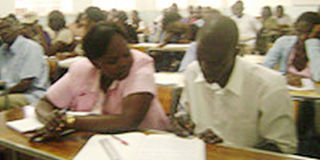Why examination malpractice persists

PRESSURE: There is immense pressure to pass exams
Last week I had an opportunity to speak to upper primary school pupils in one of Kampala’s finer private schools. During the interaction, I asked the pupils what they thought were the most pressing world problems and some ways of responding to them. There was overwhelming agreement that corruption is a major concern. But in their school world, the pupils told me a major challenge is humongous take-home assignments from their teachers which sometimes prompt copying from a colleague on Monday morning to beat submission deadlines.
I think the pupils do not consider this as contributing to a corrupt society. The more serious cases of cheating are not with homework but with qualification examinations in secondary school and university. Cheating is generally treated as if it were independent of the nature and purpose of examinations. Examination malpractice remains because there are systemic conditions on which cheating thrives.
Overemphasis on grades
I have previously observed that competition for a few good schools in Uganda leads students to work harder at simply producing grades that enable admission. A system like this promotes instructional activities that may in fact obstruct learning and instead turn out what may be referred to as ‘grade-oriented’ students. High-stakes testing brings such students to see grades as the ultimate and natural reward of schooling.
Grade-oriented students, on the other hand, base their actions on instructors’ evaluation procedures, and they work for grades. You will often hear students talking about ‘spotting’ questions and ‘tricks’ for passing examinations, an attitude that renders unexamined content irrelevant or even non-existent. Examination grades today are a proxy of how good a student is. We equate grades with value of students (how knowledgeable or competent they are). Grades define how good a student is. Grades are also used as predictors of future success. High school grades are used for admission to university. In admissions offices, universities look at grades to guess how good one will be in the future. This prompts some students who want to get into university to cheat their way to the grades required. It is possible for worth of a student and his or her grades to be different. We need a concept of worth of a student that is independent of grades.
Top universities in North America and Europe have for many years required students seeking admission even to undergraduate courses to attend oral and written competence tests. These are not usually the kind of tests one will have taken in anticipation of joining university. The Law Development Centre in Kampala now sets an entrance examination for law graduates who wish to enroll for the bar course.
This examination is an instrument for clarification of preparedness of the students, but probably also a tool to regulate those who can enter law practice every year.
Way forward
If anything is to be done about cheating, we must first recognise that at the moment examination results are a proxy for how good students are or what they can do. Cheating schools or students often get their way because grades are the lone indicator of competence. Cheating will no longer be viable once there are other ways to check for genuine competence behind good grades.
On a smaller scale, cheating may be nurtured by copying the take-home assignments out of sheer laziness or lack of interest. For instance, the best pupils have often little need for homework. There are also teachers who assign homework with little pedagogical value. Wouldn’t students who don’t learn anything by doing homework copy it? Does it make sense to punish a pupil because they are so good that they did not need to exert themselves doing homework? Some students are not motivated by what they are learning or feel their homework is pointless.
Any initiative to address cheating should also examine practices like compulsory take-home assignments that occupy school children for long hours at home. When such pupils see no learning value in homework, they may copy it to save time for more interesting activities. But also anything that hinders learning as much as cheating must be sanctioned as much as cheating. In terms of hindering learning, cheating is on a par with deliberate refusal to expend effort in study.
Those who show moral outrage at cheating but not at students who study little are not reacting to a hindrance to learning. Students who value school only as a place where grades for academic progression are to be got, and not a place of broadening one’s horizons would see no problem cheating to advance. There is after all no other requirement after producing good grades.
The author lectures at Makerere University E-mail: [email protected]




